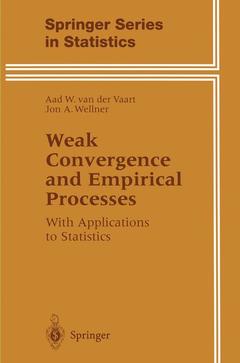Weak Convergence and Empirical Processes, Softcover reprint of the original 1st ed. 1996 With Applications to Statistics Springer Series in Statistics Series
Langue : Anglais
Auteurs : van der vaart Aad, Wellner Jon

This book tries to do three things. The first goal is to give an exposition of certain modes of stochastic convergence, in particular convergence in distribution. The classical theory of this subject was developed mostly in the 1950s and is well summarized in Billingsley (1968). During the last 15 years, the need for a more general theory allowing random elements that are not Borel measurable has become well established, particularly in developing the theory of empirical processes. Part 1 of the book, Stochastic Convergence, gives an exposition of such a theory following the ideas of J. Hoffmann-J!1Jrgensen and R. M. Dudley. A second goal is to use the weak convergence theory background devel oped in Part 1 to present an account of major components of the modern theory of empirical processes indexed by classes of sets and functions. The weak convergence theory developed in Part 1 is important for this, simply because the empirical processes studied in Part 2, Empirical Processes, arenaturally viewed as taking values in nonseparable Banach spaces, even in the most elementary cases, and are typically not Borel measurable. Much of the theory presented in Part 2 has previously been scattered in the journal literature and has, as a result, been accessible only to a relatively small number of specialists. In view of the importance of this theory for statis tics, we hope that the presentation given here will make this theory more accessible to statisticians as well as to probabilists interested in statistical applications.
1.1. Introduction.- 1.2. Outer Integrals and Measurable Majorants.- 1.3. Weak Convergence.- 1.4. Product Spaces.- 1.5. Spaces of Bounded Functions.- 1.6. Spaces of Locally Bounded Functions.- 1.7. The Ball Sigma-Field and Measurability of Suprema.- 1.8. Hilbert Spaces.- 1.9. Convergence: Almost Surely and in Probability.- 1.10. Convergence: Weak, Almost Uniform, and in Probability.- 1.11. Refinements.- 1.12. Uniformity and Metrization.- 2.1. Introduction.- 2.2. Maximal Inequalities and Covering Numbers.- 2.3. Symmetrization and Measurability.- 2.4. Glivenko-Cantelli Theorems.- 2.5. Donsker Theorems.- 2.6. Uniform Entropy Numbers.- 2.7. Bracketing Numbers.- 2.8. Uniformity in the Underlying Distribution.- 2.9. Multiplier Central Limit Theorems.- 2.10. Permanence of the Donsker Property.- 2.11. The Central Limit Theorem for Processes.- 2.12. Partial-Sum Processes.- 2.13. Other Donsker Classes.- 2.14. Tail Bounds.- 3.1. Introduction.- 3.2. M-Estimators.- 3.3. Z-Estimators.- 3.4. Rates ofConvergence.- 3.5. Random Sample Size, Poissonization and Kac Processes.- 3.6. The Bootstrap.- 3.7. The Two-Sample Problem.- 3.8. Independence Empirical Processes.- 3.9. The Delta-Method.- 3.10. Contiguity.- 3.11. Convolution and Minimax Theorems.- A. Appendix.- A.1. Inequalities.- A.2. Gaussian Processes.- A.2.1. Inequalities and Gaussian Comparison.- A.2.2. Exponential Bounds.- A.2.3. Majorizing Measures.- A.2.4. Further Results.- A.3. Rademacher Processes.- A.4. Isoperimetric Inequalities for Product Measures.- A.5. Some Limit Theorems.- A.6. More Inequalities.- A.6.1. Binomial Random Variables.- A.6.2. Multinomial Random Vectors.- A.6.3. Rademacher Sums.- Notes.- References.- Author Index.- List of Symbols.
Date de parution : 12-2012
Ouvrage de 510 p.
15.5x23.5 cm
Ancienne édition
Accéder à la nouvelle édition.
Date de parution : 11-2000
Ouvrage de 510 p.
15.6x23.4 cm
Ancienne édition
Accéder à la nouvelle édition.
Thème de Weak Convergence and Empirical Processes :
Mots-clés :
Estimator; Mathematics; Maxima; Maximum; Minimum; Random variable; Statistics
© 2024 LAVOISIER S.A.S.



